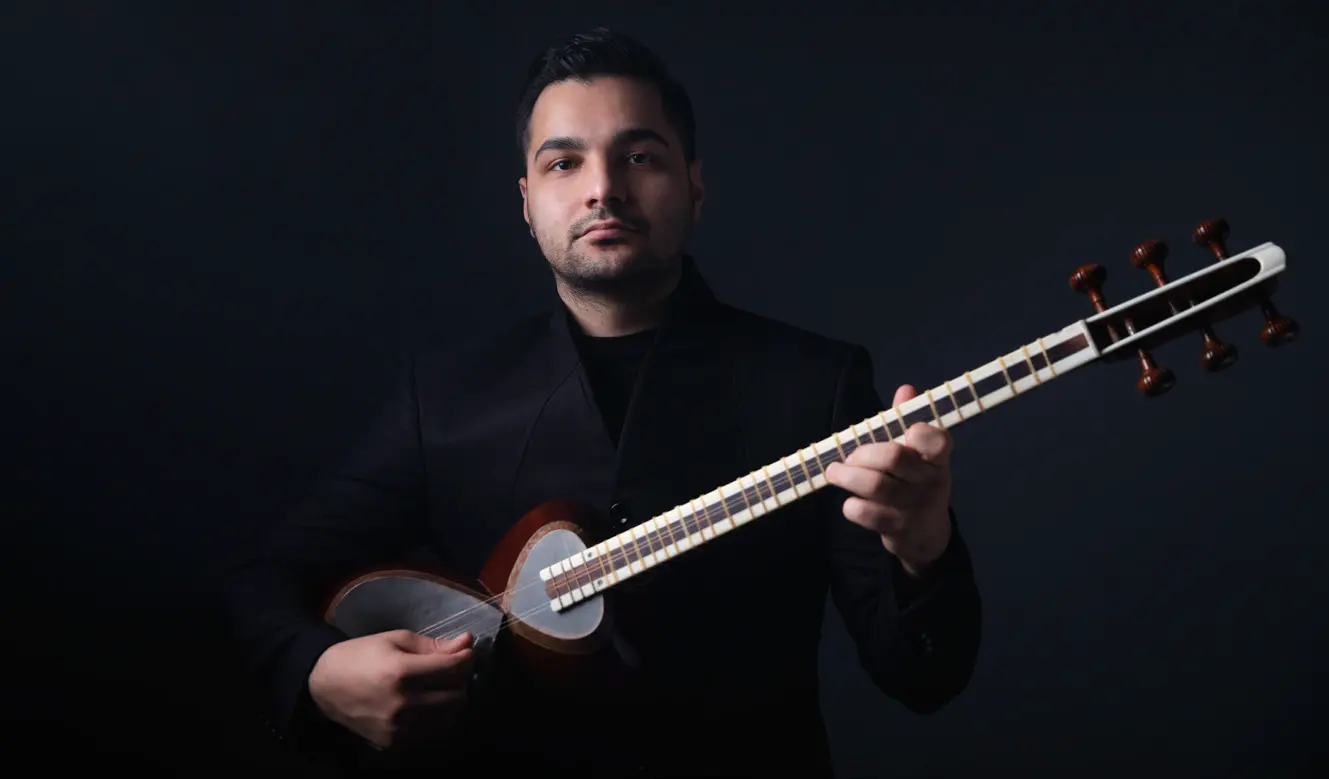
During my childhood, my father and family supported and encouraged me on my musical journey. I started music lessons and played Tar with my father. Later on, I learned Tar from Mr. Farid Irani in Mashhad, and eventually began my professional studies of Tar and Setar with maestro Keivan Saket. Finally, I graduated from the University of Arts in Tehran with a degree in music.
While collaborating and performing with well-known artists, I pursued my solo projects and created a group called ‘Minimal’ with some talented musicians. In 2018, I released an album called ‘As Aras-Concertino for Tar and Orchestra’ and I am currently working on another album called ‘Overture’. Throughout this time, I have taken part in several festivals. For instance, I won the silver medal at the ‘Global Music Awards’ in 2020, in two categories: Best Instrumentalist and Best Album. In addition, I received the ‘Djooky Music Award’ for Best Classical Composition in 2021 in the United States. styles.
An artist is infl uenced by the society around him during his creative process, and I am no exception. In Iran, as an artist – and as a sensitive individual – I observe and respond to various events and incidents to refl ect the emotionsanger, sadness, grief, and the feelings of my people.
I have collaborated with musicians from different countries and learned from each partnership.
For instance, I enjoyed performing with Shariyar Imanov, a Tar player from Baku, who had a vibrant stage presence and connected well with the audience. Additionally, I played alongside David Chadwick, a nyckelharpa player from England, who explores Eastern music passionately and demonstrates remarkable improvisational skills. I had similar experiences with other artists like Xavier Diaz Latore, a Baroque lute player, Juan Manuel Quintana, a Viola da Gamba player, and many more.
While I didn’t collaborate closely with Ms. Yasmin Levy, a fantastic singer, she heard my composition, “Saal-e Ashk,” (“The Year of Tears”), and shared her emotions about it. The piece refl ects my feelings during the bitter and challenging days of that year.
“Sometimes memories from our past emerge, memories of past lives, pain, sadness, or a yearning for something unexplainable. It’s like we are both old and young at the same time, but our soul knows what our mind cannot comprehend. This music and playing may transport you to your unknown past, like it did for me – to mountains, deserts, maybe even to God. Allow yourself to listen and see what emotions it evokes.”
I work hard to bring sensitivity to the production phase, which extends the process of creating a piece. I oversee all stages of the creative process, including music, graphics, clips, and more. When the work is created with passion, attention, and signifi cant time investment, it will resonate with the audience. Today, no matter where you live as an artist, sharing your creations on social networks can reach the farthest corners of the world.
In order to understand global music trends and their impact on my art, I closely monitor the music industry, comments and reviews on social media, and the work of other artists. I attempt to uphold my connection with the audience, putting much emphasis on Instagram. Thus, I review the feedback from my audience.
I also observe the playlists on which my songs are being reshared on Spotify. In my view, independent artists should rely on their own ideas. Even though observations can yield intriguing outcomes, ultimately, it’s the artist who leads the audience, not the other way around.

Salar Zamanian began his musical journey with initially learning music from his father, among others and studying under the tutelage of maestro Keyvan Saket. He studied music at University of Arts and has performed both individually and in groups. Salar was nominated as the best musician at the Tehran International Theater Festival in 2011 and participated in other events, such as the Persian Gulf Music Festival in 2013 and the Range Mousighi Festival in 2014. He leads a group called “Minimal” and has collaborated with acclaimed musicians. He is currently recording two albums which will soon be released. One album is titled “As Aras” Concertino for Tar and String Orchestra, and the other is titled “Overture” for Tar and string Quartet. He was awarded a silver medal at the “Global Music Awards 2020” in the categories of best instrumentalist and best album. His album was also nominated for the Best Music in Classical genre in the “Djooky Music Awards 2021” and for Best Album in the “Musicema Awards 2020”.
Opening Hours:
24/7
Address: Tradex Mena International Consulting Group L.L.C-FZ 6th Floor, Business Center, The Meydan Hotel Grandstand, Meydan Road, Nad Al Sheba, Dubai, United Arab Emirates
+971 50 240 9735
Address: TRADEX INTERNATIONAL CONSULTING DANIŞMANLIK
itH. iHr. ve TiC. LTD. ŞTi.
Tomtom Mah. istiklal Cad. Beyoğlu iş Merkezi No.187 iç Kapr No: 4 Beyoğlu/iSTANBUL Beyoğlu V.D. 8591125255